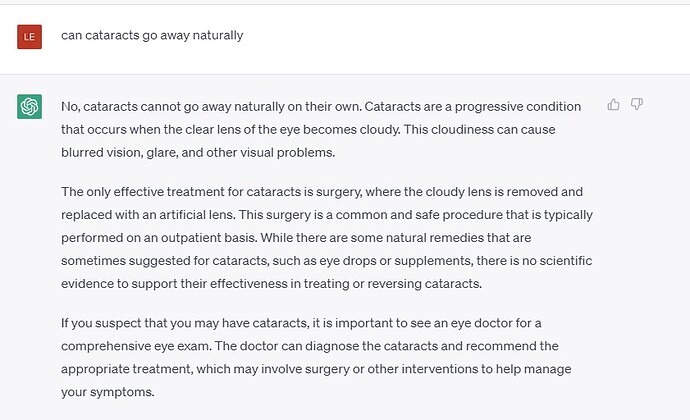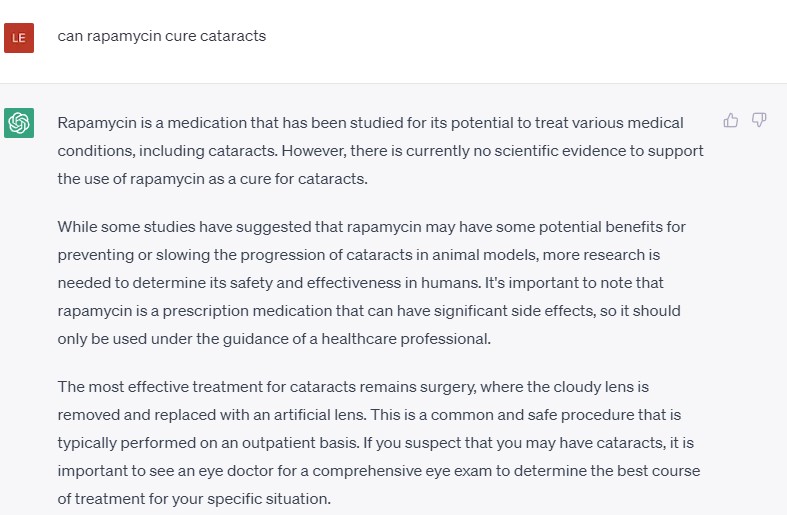My wife’s previous visit to her eye doctor told her that she would probably have her cataracts done in a couple plus years. Her last visit she was told that there were no sigh of cataracts. She has been on rapa for about 3 months. Could be the rapa or I don’t know.
Fingers crossed maybe mine will go away!
My dog has cataracts as well (not really bad cataracts, just eyes were getting milky and he was afraid going up the stairs at night, probably he’s night vision was suffering). He’s been on rapamycin for two months and eyes seem visibly clearer (not clear by any means) and seems his night vision is improving as well as he is not affraid of going up or down stairs at night. Might be my wishful optimism as studies on this are conflicting and while some studies show some reversal or slowing down there are also studies that show “chronic” rapamycin will accelerate cataracts… we will see.
Let’s ask chatgpt about cataracts:
Chatgpt, can rapa cure cataracts?
‘More research is needed.’ Isn’t it always?
Did your wife see the same doctor both times?
If rapa cured somebody’s cataracts, seems like an important piece of information, an obvious confirmation of measurable impact. And would have surfaced on more occasions by now.
Has Dr. Green ever reported out anything about effect on cataracts in his 1200 patient pop? Something to ask at the next interview.
Perhaps there are others with cataracts in our ‘seasoned’ population here at rapa news? Can anyone else report on the status of their cataracts after taking rapa for a while?
I was told I got one a few years ago, and it would be several years before it became an issue. I will get my eyes checked at the end of this year. Will be interesting to see what has happened, if anything.
I had the same warning 3 or 4 years ago that I would need my cataracts removed soon.
Three years on rapa, and while other younger friends and relatives required the surgery, mine still have not progressed to the point that they need to be removed.
I believe it is quite likely that rapa slows the advance of cataracts.
That’s great news.
But if after three years of rapa use the cataract is still there, that’s a significantly different outcome than having one disappear after three months.
@CoachHarvey, what is the dose regimen your wife has been following those three months?
I had cataracts before I started Rapa and even went to get an exam and estimate from the local surgeon. Hard to get straight answers on this one. My vision was in decline for sure.
3 years of Rapa and my vision has improved for sure. Most recent test is that I have one in the left eye still, but I don’t notice it and my vision has been pretty reliable lately.
Just as an aside. I had cataracts removed and replaced by intraocular lens transplants.
The surgery was easy and recovery time is very rapid. I was astonished at the improvement because I hadn’t realized how bad my cataracts were. My impaired night driving made me make the decision. Most insurances will pay for it you can convince your doctor that it is time to do something about your cataracts.
I’ve just started developing cataracts at 65 and I’ve been using rapamycin (5-7 mg every 7-10 days) for about 4 years. Also I read one paper that found that in mice it increased the incidence of cataracts! The age related mechanism seems to be the stiffening of the lens proteins that starts with presbyopia around 45. That reduces the permeability to antioxidants like glutathione that protect the lens proteins from oxidation.
My wife exoerienced the exact same thing, just returning form the eye doctor. Wow
Also her sight has improve substantially, not sure it is related to the improved cataracts.
She takes 5mg once a week, and will skip a week ever so often but not regularly. Our 12-year-old Goldendoodle takes 3mg with us once a week. I take 7mg. The only side effect I get, which I can’t be sure it is the Sirolimus it a few isolated small pimples.
Interestingly the conventional wisdom is that cataracts cannot be cleared. However, my optician says people with diabetes can reduce cataracts if they control the diabetes. It may be worth having a conversation with your optician about this as there can be clouding of the lens which is visible with a slit test, but has no effect on vision and falls short of a diagnosed level of cateracts.
I put in a system of more frequent tests with the agreement of my optician to see if I could clear some of the minor cloudiness that I had. This was part of my motivation to reduce my alcohol consumption as alcohol and UV are known to cause clouding of the lens. Normally tests are many months apart, but we have been testing every few weeks. Interestingly my optician has now seen one eye clear the minor cloudiness although the other eye needs to make further progress.
This process clearly is a dynamic equilibrium which can move both ways.
That is my observation; I have known a lot of people who developed cataracts, and none were cleared without surgery.
I had intraocular lens transplants, also known as refractive lens exchange (RLE) or cataract surgery, two decades ago, when I started having trouble seeing at night.
I can’t recommend this highly enough. The results were fantastic, and today there are many more options. Today’s lenses are vastly improved over what was available two decades ago.
Ooh, that’s my plan - IOL, but not because of cataracts, which are very minor in my case, no issues with night vision. Problem is deteriorating acuity and both distance and starting presbyopia. So I want to correct my vision and not have to wear glasses. If the eyeball stabilizes, doesn’t change shape, it should be a one and done type operation. Right now I’m 67 and will wait a bit to see if my eyes have stabilized before I have lens replacement. The extra time should allow more progress to be made in lens technology - it seems the tech is developing pretty rapidly these days. I’m thinking no later than five years from now, I’ll be 72, not too old as yet for the procedure, but maybe old enough to last me the rest of my life.
There are many options in IOL transplants. I have no idea what current doctors are doing with their patients. When I had my eyes done, there were three options: both lenses for distance, both lenses for near, one lens for far, and one lens for near.
The people that I know had one lens near and one lens far. We develop presbyopia as we age, losing the ability of the lens to change shape, and of course the lens transplants don’t change shape.
The theory of one near, one far suggests that the brain adapts to using one for distance viewing, such as driving a car, and another for near objects, like reading. By choosing this option, they didn’t need glasses.
So, my doctor suggested contact lenses for thirty days to see what I preferred.
I never adapted to the ‘one lens near, one lens far’ option when using contact lenses.
Because I have been nearsighted for most of my life, I am used to wearing glasses for correction. At that time, since I was still playing tennis, I chose to have both contact lenses correct for far vision. That way, I could play tennis and drive my car without glasses.
I use glasses for reading.
If I had it to do over again (that is always an option), I would choose to have both lenses for near vision, as I spend more time looking at computer screens and reading.
Currently, there are lenses available that are similar to Verilux graduated lenses. But I never liked them either.
Your doctor should let you try the contact lens version of the implants to see if you like the result.
Thanks! I already reached the conclusion that near distance is going to be more important to me - reading and looking at screens, so very near, near and medium. That will be my priority.
That said, I’m in an unusual situation. I have natural monovision which developed in my early 20’s. My right eye developed a -3 diopter myopia, and it started focusing exclusively on short-medium distances, that’s what I have always used for reading. My left eye was left for distance vision only. I’ve had this now for over 40 years. Strangely, no issues with stereovision associated capabilities, like seeing 3D movies or judging depth - I think my brain fully adapted to this situation.
So my idea is to just keep this with the IOL. Now, apparently the extended vision lenses have become extremely good, no more rings and starbursts and night vision issues. So I’ll keep my left eye for vision, but make it sharper (I’ve started losing this past 60), and there are hints of presbyopia creeping in, so I will keep a good near vision lens for my right eye. Now, if extended vision lenses can stretch just a bit, I can cover medium and close with one eye, and far distance and medium to the other and gain back some stereo vision possibly. I’ll wait to see what lens technology brings us in the next five years.
Yes. There are however several aminal studies that indicate that N-acetyl-l-carnosine eyedrops can partially clear cataracts. They don’t seem to be super effective though or perhaps only noticeably effective in some people that take it for long enough. Life Extension foundation used to sell the eyedrops so if they were very effective at reversing cataracts that would be well known by now. I think they are more likely to be effective for prevention over the long run or for slow modest reversal in subset of people.
What I’d really like is something that gets rid of floaters. I have a floater that appeared a couple of years ago in one of my eyes and is super irritating. The advice I got is that you’ll stop noticing it. Well I haven’t. The various supplements that supposedly get rid of floaters rarely do, and surgery/laser are risky procedures. It would be awesome if rapa got rid of floaters, but seems unlikely.
I’m glad you mentioned you’ve tried Verilux lenses. I’ll overshare incase there is anything you can comment on. And note, I have no idea how many versions of Verilux there might be.
I am experimenting with my first pair of progressive glasses, and while they are great for driving or grocery shopping, they are horrible to use in the house. The area in which to read is much too tiny, and I can’t do more than read a label or a quick text. I’d never do this with them on, so I take them off and put on my readers.
I was told Verilux makes much better lenses and the field of vision will be wider, and it will also be much more expensive (I purchased mine at warby Parker)… I hesitate investing in them when I’m nervous they still won’t serve the purpose of being the only pair of glasses I need.
Any thoughts based on your experience?
Yes, I bought the original Verilux, and later on, I tried another variable focus brand.
I got used to them after a couple of months, but I never liked them.
They are like things that do too many things and none of them well.
Plus, the cost was three times the price of my regular glasses. Many people must like them because they are still in business.

